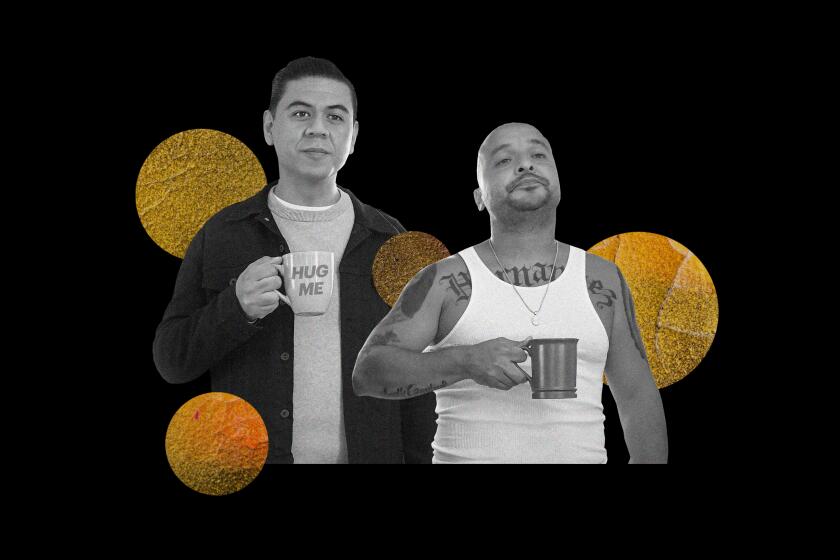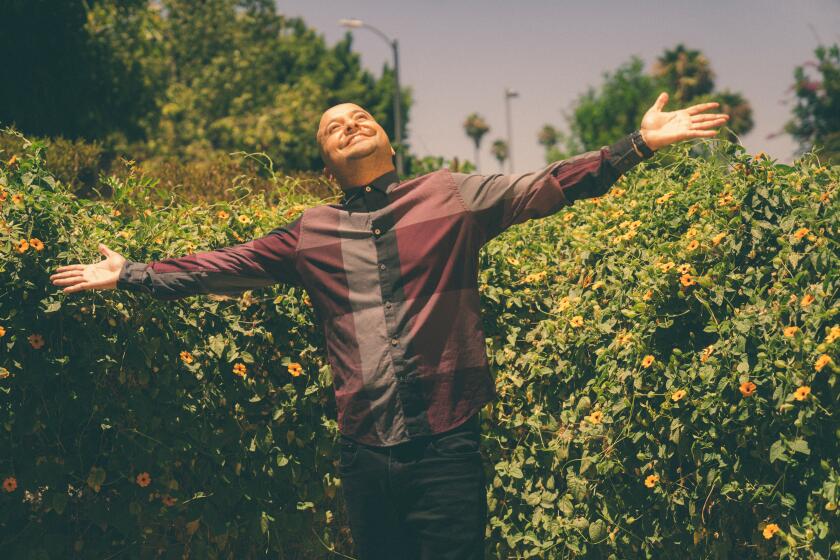In Season 2 of ‘This Fool,’ Chris Estrada ramps up the crises and dark jokes
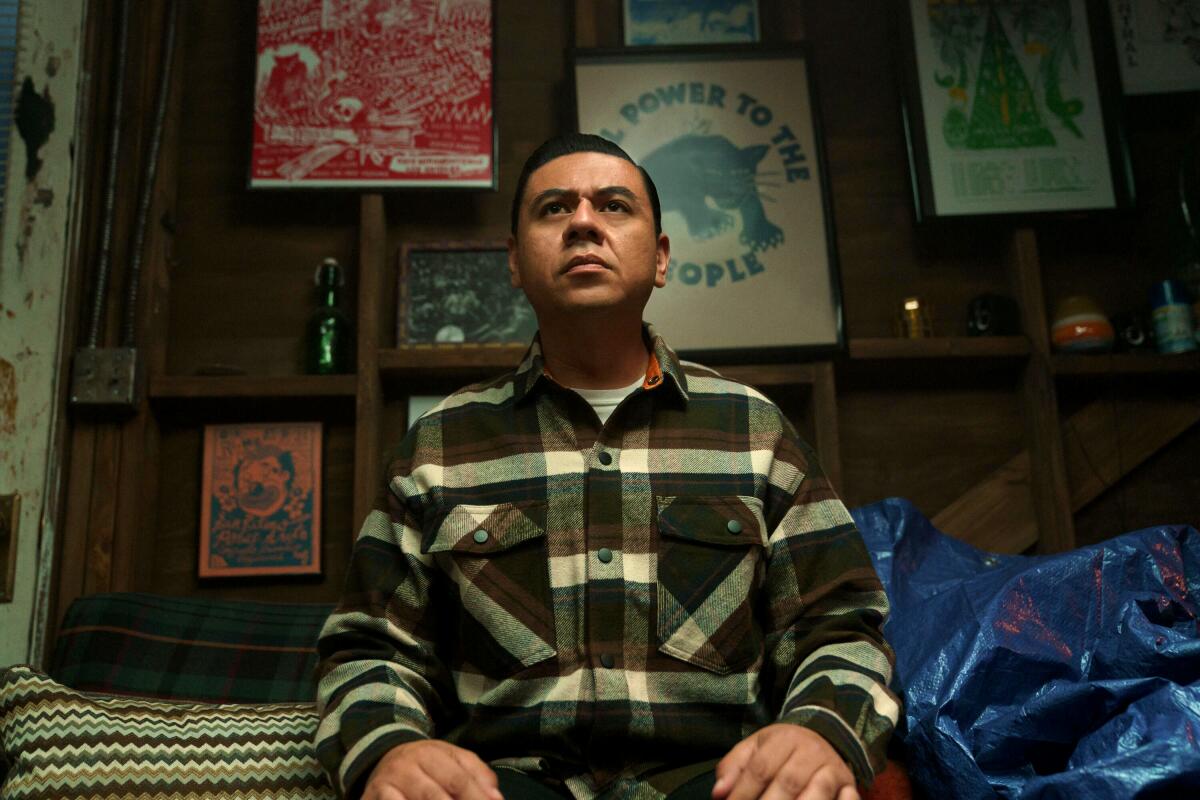
- Share via
When Chris Estrada was growing up in Los Angeles in the ‘90s, he got to see the gestalt of the region. He learned to drive at a young age, “like 13 or 14,” he says, as a necessity. His mom worked two jobs while his grandma watched the kids.
“My mom would be like, ‘Si se pone mala tu abuelita, la tienes [que] manejar al hospital’ [If your grandma gets sick, you have to drive her to the hospital]” he recalls.
Over time, he got to know the area, driving through downtown L.A., Koreatown, Hollywood, Compton and the neighborhoods he grew up in: Inglewood and South-Central.
With “This Fool,” the slice-of-life Hulu comedy that Estrada helped create and in which he stars, he is showing a part of Los Angeles, and its people, that is rarely seen on screen. After developing a loyal following in the stand-up comedy circuit over the past roughly 10 years by, in part, sharing observations of his Mexican American working-class family, Estrada now joins the cadre of comedians whose life is mined for the screen.
Like his stand-up, the series is loosely based on his upbringing as a first-generation Mexican American. Estrada stars as Julio, a 30-something mostly well-meaning slacker who lives in his mom’s garage in South-Central, along with his ex-gang member cousin Luis (Frankie Quiñones).
“I didn’t want to make a show about ‘good’ guys,” Estrada says. “I didn’t want Julio to be Ted Lasso.”
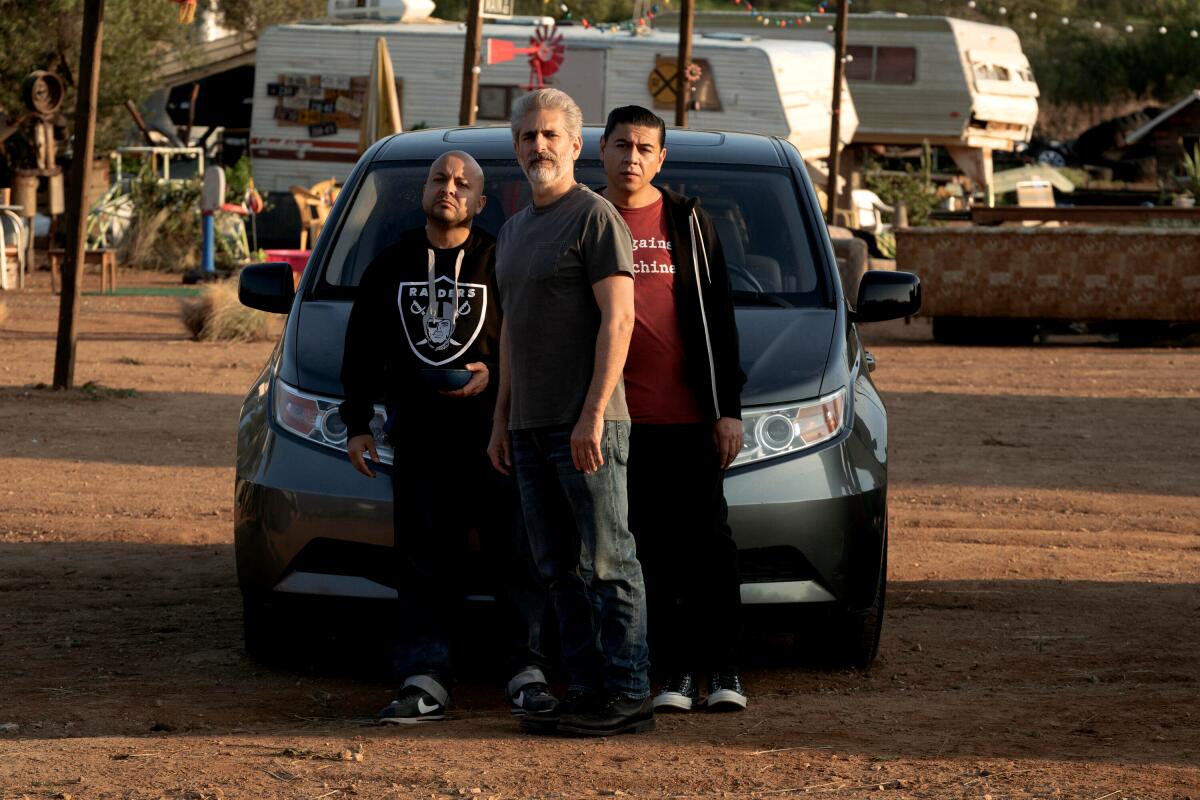
We talk to Chris Estrada about “This Fool,” a “sweet, funny, sometimes rowdy comedy set in South. L.A.”
Julio works at a gang rehabilitation program called Hugs Not Thugs, which gives ex-cons jobs as cupcake bakers and distributors, a program founded and managed by comically well-endowed Minister Payne (Michael Imperioli). Much of the first season was propelled by the return of Luis after his release from prison, and the ensuing mischief that he and Julio get caught up in, like when they unsuccessfully tried to assemble their old crew after being challenged to a fight in a park.
“The way we pitched the show was it’s ‘Friday’ but directed by the Coen Brothers,” he says.
He mentions being inspired by the 1978 film “Killer of the Sheep,” which was directed by Charles Burnett. Set in Watts, it revolves around a man who works at a slaughterhouse; he’s going through an existential crisis and feeling stuck in life. With the new season, which premiered Friday, Estrada wanted to take a darker and grittier turn without sacrificing the comedy and to open up Julio’s world.
The season opens with Julio out of a job after Hugs Not Thugs failed to secure enough funding to stay open, and his on-and-off again relationship with his ex Maggie (Michelle Ortiz) is off again. He’s a mess and trying to get his life back on track — he eventually starts a new coffee shop called Mugs Not Thugs — just as Luis is experiencing some stability with a new job and a new love interest. Minister Payne? Well, he’s launched an OnlyFans account.
In keeping with the first season, in the midst of all the high jinks, the window into the social and financial nuances that inform the lives of Julio and the people in his orbit, is crucial to the show’s richness. The sixth episode of the season, “Los Personas Invisables,” follows Esperanza (Laura Patalano), Julio’s mother, as she adjusts to life after retiring from her janitor job, and it evokes a tone inspired by Spanish filmmaker Pedro Almodóvar. The episode opens with a man at the company she worked for, who is tasked with signing her farewell card.
“What are you doing?” his colleague asks.
“Trying to figure out what to write in this retirement card for Es-per-anza, whoever that is,” says the man, who boasts about his Spanish proficiency.
“What about: ‘Retirement is like getting a Lifetime Achievement Award. The only thing left to do is die’?” his colleague suggests.
The camera zooms in on the card to show the message written: “Usted va a morir muy pronto. Felicidades!” (You are going to die very soon. Congrats!)
Matt Ingebretson, who worked with Estrada on creating the series, along with Jake Weisman and Pat Bishop, says Estrada’s worldview, and his ability to mine the laughs from it, have served him well in his first TV show.
“He’s extremely smart, and smart in the way that he thinks about film and TV,” Ingebretson said. “Kind of by default, he is a hypercritical person of art or media. He’s a very natural like writer because he’s a real student of film and television.”
“His stand-up was very grounded to his identity and his upbringing,” Bishop adds. “We wanted to build off of that versus like, coming up with a show about being in outer space or something. All the stories that he told us from growing up, his life in South-Central, were really funny, but also interesting and had a dark side to them, which is really compelling ... he knows what he wants, and he knows what rings true to him.”
“This Fool” is one of the few scripted series that features a predominantly Latino cast in the current programming landscape. For Estrada, the series has deep personal resonance and he sees it as an opportunity to upend the usual Hollywood clichés, not avoid them, by presenting an authentic look at the lives of working-class people.
“I’m not a college graduate; I barely graduated high school,” he says. “I had s— jobs. I worked in construction. I was a valet driver. I worked in customer service. If you’re looking for that sort of respectable representation, or what you deem that to be, go find that somewhere else. I’ve had a checkered past. I’ve done drugs. My mom was a janitor, I grew up working class and grew up without my dad; he wasn’t in my life that much. That’s my reality. It doesn’t have to be your reality.”
He puts it this way for perspective: “A lot of the show is thinking about people trying to do the right thing with their life with minimal means. Every achievement feels like one step forward, and then two steps backwards. I remember I was working at this warehouse and I had worked overtime and felt, like, ‘Damn, I got a really good check.’ Then when I came out, my car was towed. That’s what life feels like sometimes when you’re in that working-class existence.”
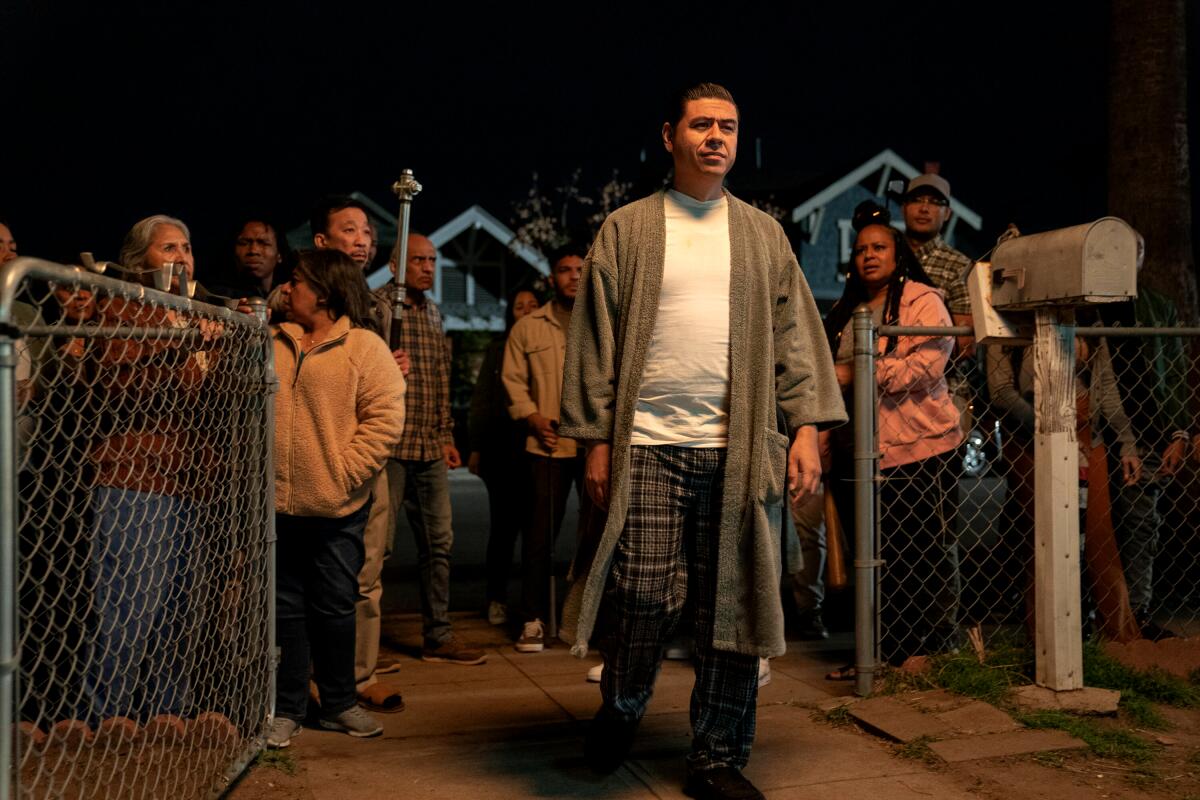
The stand-up comedian-turned-viral TikTok star talks about the L.A.-roots of sketches based on his family
It’s a couple of weeks before Hollywood actors would go on strike, and Estrada is sitting inside the Los Feliz apartment he shares with his girlfriend for our video call. He’s more soft-spoken than his demeanor on stage, or in the show, as he reflects on his journey.
If his cinematic influences displayed on the show weren’t already a clue, Estrada’s interest in film and TV runs deep. He was a kid who grew up watching lots of movies and TV, as well as reading comic books and listening to punk rock. Before he pursued a career in stand-up comedy, he was first interested in breaking into Hollywood as a screenwriter. But there wasn’t an obvious path.
While working regular jobs, he bought books on screenwriting to learn the art of narrative techniques, like cold opens and act breaks. He eventually wrote spec scripts for “New Girl” and “Archer” because such writing samples were a requirement for applying to various writing programs in Hollywood.
By 2013, with his nights free, he found an open mic and his stand-up career began taking shape, performing at spots like Maverick’s Flat in Leimert Park. He steadily built buzz in the industry, getting named as a comic to watch by Time Out L.A. and Vulture, and he was among those featured by Comedy Central as one of its Up Next Comedians at Clusterfest.
“This Fool” is Estrada’s first major acting role after a string of blips in shorts and an appearance in Comedy Central’s “Corporate,” which was co-created by Bishop, Weisman and Ingebretson. Estrada has been working with an acting coach, John Rosenfeld, since the first season. But he still hesitates on whether he feels more comfortable in front of the camera two seasons into “This Fool.”
“This is my first time ever acting at this level,” he says. “Because it is a version of myself, I do feel comfortable. But with doing this, insecurities come out of, like, I don’t like how I look, and you just got to fight those insecurities. But acting is something that I really respect and I want to keep doing more of it. Acting with someone like Michael Imperioli — who is really at the top of his game — it’s intimidating. Sometimes you cut yourself wondering, ‘Does he think I’m doing a good job?’ It’s good because it makes you up your game, but it’s nerve-wracking.”
Estrada says he’s still getting used to being noticed in public because of the show. He shares a story about being at Los Angeles International Airport, where he was recognized by a young woman working for Southwest Airlines.
“Hey, where’s your cousin?” she said.
“I left him at the garage,” he quipped.
Still, his expansion into TV has meant pulling away from the stage — at least during the months he’s filming. And that’s been an adjustment.
“Because I’m so tied to doing stand-up, I do miss it,” he says. “You get irrational thoughts, like, people are gonna forget who I am or I’m gonna suck because it’s been so long and I’ll never be able to do it again.”
Since the show has premiered, he’s avoided incorporating that part of his life into his routine. (“I just think it’s kind of an unreasonably unrelatable thing,” he says.) And he’s careful to be clear that he’s not abandoning his roots on stage by expanding his footprint in Hollywood.
“I want to keep doing stand-up,” he says, noting his appearance at the San Jose Improv that took place a few days after the interview. “It got me here. I don’t see myself stopping anytime soon.”
More to Read
The complete guide to home viewing
Get Screen Gab for everything about the TV shows and streaming movies everyone’s talking about.
You may occasionally receive promotional content from the Los Angeles Times.
